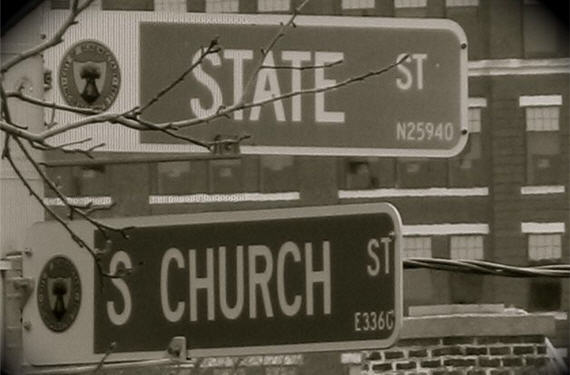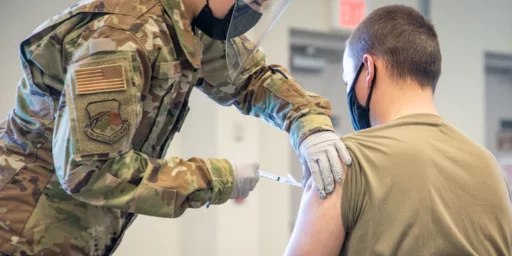Air Force Lifts Requirement For Enlistees To Say ‘So Help Me God’ In Oath
Earlier this month, I noted the case of an unnamed member of the Air Force who had been denied reenlistment because he declined to say “so help me God” at the end of his enlistment oath. As I noted at the time, while this language is set forth in the statute that creates the oath, every other branch of the Armed Forces, including the Air Force until just last year, had allowed enlistees to leave that language out if it conflicted with their religious or philosophical beliefs. Clearly, then, the insistence of the Air Force now that all enlistees must use the language regardless of their beliefs would be unconstitutional, and it seemed as though we might be headed down the road to a Federal lawsuit on the matter. Fortunately, sanity has prevailed in the Air Force and enlistees will now be allowed to omit the language from the oath if they so choose:
After an airman was unable to complete his reenlistment because he omitted the part of a required oath that states “so help me God,” the Air Force changed its instructions for the oath.
Following a review of the policy by the Department of Defense General Counsel, the Air Force will now permit airmen to omit the phrase, should they so choose. That change is effective immediately, according to an Air Force statement.
“We take any instance in which Airmen report concerns regarding religious freedom seriously,” Secretary of the Air Force Deborah Lee James said in the statement. “We are making the appropriate adjustments to ensure our Airmen’s rights are protected.
“The Air Force will be updating the instructions for both enlisted and commissioned Airmen to reflect these changes in the coming weeks, but the policy change is effective now. Airmen who choose to omit the words ‘So help me God’ from enlistment and officer appointment oaths may do so.”
The issue gained national attention in early September after a letter from the American Humanist Association outlined the case of an airman stationed at Creech Air Force Base in Nevada who was unable to complete his reenlistment after striking out the phrase in question on a form. The AHA said it was prepared to sue on religious freedom grounds unless the airman was allowed to reenlist without saying the phrase. The requirement, the AHA argued, violated the Establishment Clause of the U.S. Constitution.
The issue drew attention to a previously unnoticed rule change: The rules governing the Air Force’s enlistment oaths used to include a note stating that “Airmen may omit the words ‘so help me God,’ if desired for personal reasons.” That exception quietly disappeared in October 2013, after which the Air Force required the inclusion of the full oath for any enlistment or reenlistment.
As Eugene Volokh notes, this is the correct decision. Not just as a matter of policy, because no government agency should be forcing people to make declarations of religious faith against their will, but because it is consistent with the Constitution, with applicable law, and with the practices of every other branch of the military. As I noted when I first wrote about this, the Air Force has had a problem in recent years with what are clearly improper intrusions of religious doctrine and prostelyzing in its ranks, which seems odd in itself because one would think that culturally this would be more likely in the Army or the Marine Corps, but perhaps this is a sign that some degree of sanity is returning to that institution.







Volokh engages in some neat sophistry to get around the PLAIN LANGUAGE of the statute. Statutory construction 101: you only look to other sources of law to interpret a statute when the plain language is ambiguous. There’s no ambiguity present here, yet he reads affirmation to read OUT words that passed both houses of Congress and were presented and signed by the President. It’s a neat results based trick, but it’s bad lawyering.
I don’t think So Help Me God should be their either — it’s oppressive to nonbelievers — but the change should be made by Congress or a court of competent jurisdiction, not a staff attorney at DODGC.
Volokh makes three irrefutable points
One, the statute in question references 1 USC 1 which allows for either an “oath” as defined in the statute or an “affirmation” which omits reference to any Supreme Being.
Second, he makes note, as I did in my original post on this issue, of the provisions of Article VI, Clause 3 of the Constitution, which specifically provides that there shall be no religious test for any Federal office, which includes the United States military. If there were no exception in the law and regulations for someone to refuse to say “so help be God,” then the oath itself would be unconstitutional.
Third, an additional Constitutional argument can be found in Court holdings that the government may not exclude someone from holding an office because they are an atheist or agnostic.
Finally, the fact that every other service branch makes this exception is strong evidence in favor of the proposition that the Air Force was wrong when it changed its regulations last October
Maybe it’s time to reevaluate the F-35 program.
@Butch Bracknell: If the PLAIN LANGUAGE of the statute is in direct conflict with the plain language of the constitution, no ascend by congress and president can make it valid.
And gVORo8, it’s too early to be that drunk.
Doug: “As I noted when I first wrote about this, the Air Force has had a problem in recent years with what are clearly improper intrusions of religious doctrine and prostelyzing in its ranks, which seems odd in itself because one would think that culturally this would be more likely in the Army or the Marine Corps, but perhaps this is a sign that some degree of sanity is returning to that institution.”
This has been covered elsewhere – basically, certain sect of white, right-wing Evangelical/Fundamentalists made an early effort to capture the USAF officer corps, and set up shop right next door to the USAF Academy.
They were successful.
It sounds like we have a couple of basic problems:
– The referenced law, as passed by Congress, is at best ambiguous and at worst blatantly unconstitutional
– The various services have used some form of common sense to continue functioning, but recently one (curiously anonymous) commander at Creech AFB decided to basically force everyone under his command to pledge Christianity
So, it sounds like the JAG folks put the brakes on this mess, but there’s still the problem of AF commanders with disturbingly poor understanding of the Constitution they’re supposed to be defending…
@Butch Bracknell:
The plain language of the law is irrelevant when it contradicts to plain language of the constitution.
Here is a more just way to resolve the situation moreso than was noted in the original post:
– identify the person or persons who wrote the oath requirement change
– identify the person or persons who signed off on the oath requirement change
– cashier the lot of them, rescind their pensions, and make them write out the Constitution of the United States in long hand 52 times (50 for the individual States, one for D.C. and one for the overseas territories)
I would still think there is an interesting story here about how the change was made and how it got through the Air Force General Counsel’s Office during the regulation review process. Were the lawyer objections overruled and the Christiantists just thought no one would squawk about it (and since Wenstein has been waging a very public fight with the Air Force for the last 15 years on this subject, that is hard to believe.) I can tell you what happen very quickly. The Secretary of the Air Force started asking how did this happen, someone said we will be okay if DoD says “just follow the law,” and DoD came back “r you guys crazy!! Your policy is plainly violates specific black letter language in the U.S. Constitution. The statute has to be interpreted in the light of the clear Constitutional prohibition against religious “tests” in oaths of office. We are not going to defend you, DoJ will not defend you, so change your policy back to the old one.”